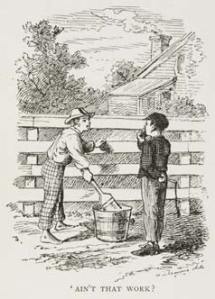Turning the Tables: FDR, Tom Sawyer, and me
Before television and the internet, political candidates had two primary means of getting their image out into the public: live appearances and campaign posters. And given the limited reach of the former, posters were a crucial element in political strategy. How else were candidates supposed to project an image of decisiveness and gravitas?
So when Franklin D. Roosevelt ran for governor of New York in 1928, his campaign manager had thousands of posters printed with Roosevelt looking at the viewer with serene confidence. There was just one problem. The campaign manager realized they didn’t have the rights to the photo from the small studio where it had been taken.
Using the posters could have gotten the campaign sued, which would have meant bad publicity and monetary loss. Not using the posters would have guaranteed equally bad results—no publicity and monetary loss. The race was extremely close, so what was he to do? He decided to reframe the issue. He called the owner of the studio (and the photograph) and told him that Roosevelt’s campaign was choosing a portrait from those taken by a number of fledgling artists and studios. “How much would you be willing to pay to see your work hung up all over New York?” he asked the owner. The owner thought for a minute and responded that he would be willing to pay $120 for the privilege of providing Roosevelt’s photo. He happily informed him that he accepted the offer and gave him the address to which he could send the check. With this small rearrangement of the facts, the crafty campaign manager was able to turn lose-lose into win-win.
This story reminds me of the famed trickster, Tom Sawyer, who duped the neighborhood boys into trading him toys and apples for the chance to whitewash a fence. When one of the boys taunted him for having to work instead of going swimming, Tom responded with all seriousness, “I don’t see why I oughtn’t to like it. Does a boy get a chance to whitewash a fence every day?” Then when the boy asked for a chance to try it, Tom hemmed and hawed until finally the boy said he would give up his apple for a chance to whitewash the fence. Once Tom had one taker, outsourcing the rest of the work to other boys was a snap.
I conducted a similar experiment in a class I was teaching on managerial psychology. One day, I opened my lecture with a brief reading of a poem by Walt Whitman, after which I informed the students I would be doing a few short poetry readings, and that space was limited. I passed out sheets of paper providing students with the schedule of these readings along with a survey. Half of the students were asked whether they would be willing to pay $10 to come listen to my reading; the other half were asked whether they would be willing to listen to my reading in exchange for $10. Sure enough, those in the second group set a price for enduring my poetry reading (ranging from $1 to $5). The first half, however, seemed quite willing to pay to attend my poetry reading (from $1 to about $4). Keep in mind that the second group could have turned the tables and asked to be paid for listening to my recitation, but they didn’t.
In all of these situations, people (the campaign manager, Sawyer, and myself) were able to take a situation of disadvantage or ambiguous value and spin it to their (my) advantage. Once Sawyer pretended to be unwilling to part with the privilege of whitewashing, other boys wanted it, because obviously Tom was hoarding all the fun. When I told my students that space was limited and gave a suggested price for the recitation, I created the idea that this was an experience they would definitely want to have (as opposed to the other group, to whom I insinuated that listening to my reading of Whitman might be less than enjoyable).
I think Twain summed this strategy up best when he wrote the following about Tom: “He had discovered a great law of human action, without knowing it – namely, that in order to make a man or a boy covet a thing, it is only necessary to make the thing difficult to attain.”

 Tweet
Tweet  Like
Like